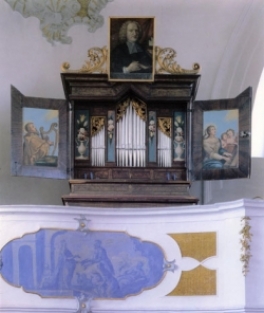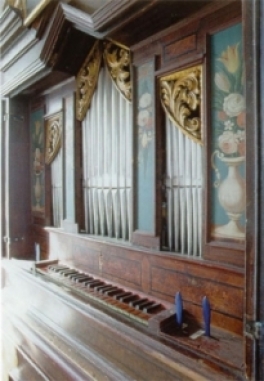 |
Füssen, Spitalkirche

Ascr. Andreas Jäger 1734
State of preservation: original
The organ was made for the cemetery church St. Sebastian and was moved to Hl.
Geist-Spitalkirche when Jäger built a new organ in St. Sebastian in 1772.
This instrument represents an important branch in the productions of a baroque organ maker, the small organ of multiple possible use, whether as a filial church organ, domestic organ or for processions. Top priority for those instruments was being compact requiring joining all necessary components in a single case, and lightweight to enable being carried by two or at most four people.Their sound should be audible even in open air over a number of singers in processions. A specification without fifths not to puzzle the singers, with diapason high ranks carrying a melody into distance and a stopped fundament of light wood to keep it together matched these requirements best.

Its maker Andreas Jäger proved himself being an extraordinary master of space economy. Instruments of this kind by him have survived in a significant number. He also built at least one organ for every church of his home town Füssen from his early years in the 1730s to his death (all extant except 2), a remarkable monument of baroque organ maker's art.
This might have been his first organ and was replaced by one of his last built in 1772 in St. Sebastian. It has some sister instruments in close resemblance, a procession organ in Elbigenalp or the organ in Latsch (Vintschgau) Hl. Geist. Its four stops now fill a space of about 100 seats. That its original church was slightly bigger is still visible in the fact that the organist has to sit on the parapet of the gallery while playing despite the small size of the instrument.
Music sample
Gottlieb Muffat: Toccata undecima in e,
(from 72 Versetl sammt 12 Toccaten)
played by Wolfgang Baumgratz
Specification:
Copl 8’
Flaute 4’
Octav 2’
Octav 1’
© Greifenberger Institut für Musikinstrumentenkunde | info@greifenberger-institut.de



